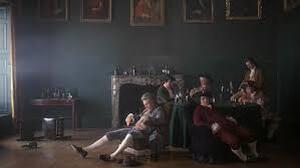Barry Lyndon

Stanley Kubrick entered the 1970s as a visionary filmmaker whose body of cinematic work spanned multiple genres, from war (Paths of Glory) to satire (Dr. Strangelove) to science fiction (2001: A Space Odyssey). With each of these films, he would continue to refine his singular directorial voice, characterized by meticulous framing, deliberate pacing, and an increasingly detached, almost clinical perspective on human nature. This evolution culminated in A Clockwork Orange, a dystopian masterwork that became both a cultural sensation and a lightning rod for controversy. Seeking a complete stylistic and tonal shift, Kubrick would find it with his next project.
Initially, he intended to create a sprawling biopic of Napoleon Bonaparte – his long-cherished dream project – but budgetary concerns led to its collapse. Instead, Kubrick turned to William Makepeace Thackery’s 1844 novel The Luck of Barry Lyndon. Its ironic exploration of social climbing, aristocratic excess, and the cruel hand of fate resonated deeply with the director’s worldview, aligning with his artistic ambitions and his cynical sensibilities. The resulting film, Barry Lyndon, would become one of the most visually stunning period pieces ever made – a motion picture whose every frame evokes the essence of 18th century Europe in both its form and content.
Kubrick’s obsession with historical authenticity was the driving force behind and dominated every aspect of Barry Lyndon’s production, crafting a world that achieves the look and feel of a living history. Using specially modified NASA lenses to capture scenes illuminated solely by candlelight, he imbued the film with a luminous, almost ethereal quality, as though the audience were gazing into a world suspended in time. The equally meticulous attention to landscapes, costumes, and set design – executed on a scale that had never been attempted before – resulted in an immersive grandeur that feels lifted directly from the paintings of the era.
The film tells the story of Redmond Barry (Ryan O’Neal), a young Irish rogue of modest means raised by his widowed mother. His early life defined by feelings of restlessness and ambition, Barry is sent away by his family after an impulsive duel, only to be quickly robbed and left penniless. Desperate, he enlists in the British Army and serves in the Seven Years’ War. After proving himself in battle, he deserts his post and assumes the identity of a British nobleman; however, he is soon discovered in his lie by Prussian officers and conscripted into their army.
Barry’s cunning allows him to ingratiate himself with Captain Potzdorf, a Prussian officer, who assigns him to spy on the Chevalier de Balibari, an Irish gambler suspected of espionage. Instead of betraying him, Barry befriends the Chevalier, and together they swindle their way through European aristocracy. His greatest success comes when he seduces and marries the wealthy Lady Lyndon (Marisa Berenson), securing an honorific title and a vast fortune. Now fully ensconced in high society, Barry abandons his humble past, indulging in aristocratic privilege, squandering wealth, mistreating his frail wife, and pursuing his final aspiration – an official noble title.
His stepson, the arrogant Lord Bullington, despises Barry for his opportunism and, in a pivotal moment of public disgarce, interrupts a grand musical performance to openly declare his hatred for his unworthy stepfather and denounce him. Enraged, Barry viciously beats him before the assembled guests – an unforgivable breach of decorum that shatters his hopes of securing nobility and cements Bullington as a sworn enemy, who bides his time waiting for revenge. Tragedy soon follows when Barry’s only legitimate son, Bryan, dies in a horseback riding accident. Devastated, Barry descends into drinking and self-pity, while Lady Lyndon retreats further into despair.
This collapse leads to the film’s climactic confrontation. Now a grown man, Bullington returns to challenge Barry to a pistol duel. In a cruel twist of fate, Bullington misfires his first shot. Barry, given the opportunity to kill his stepson, instead fires deliberately into the ground – a rare moment of mercy. But his restraint is not reciprocated. Bullington takes his second shot, shattering Barry’s leg and his dignity. Exiled and ruined, Barry is left to wander Europe, reinforcing the film’s ultimate message: wealth and power are ephemeral, and in the end, all are reduced to nothing by time and fate.
Kubrick’s approach is deliberate and methodical, with an omniscient narrator guiding the audience through Barry’s rise and fall with a wry detachment. By foreshadowing key events before they happen, the narration reinforces the inevitability of Barry’s downfall. He believes he can shape his own destiny, yet at every turn, he is at the mercy of forces beyond his control, and in the end any riches acquired were utterly meaningless. The film suggests that social mobility is an illusion – no matter how high Barry climbs, he remains an outsider in an aristocracy where bloodlines and tradition outweigh ambition and cunning.
Upon it release, Barry Lyndon received a lukewarm response. While critics and audiences admired its visual splendor, many found its narrative oppressively slow and its characters emotionally distant. Today, however, it is recognized as one of Kubrick’s greatest achievements – a film whose measured pacing and artistic grandeur reveal deeper levels with each viewing. Its cinematography remains among the most breathtaking ever committed to film, and what was once perceived as cold and alienating now feels deliberate and uncompromising, a motion picture that rewards patience and leaves an indelible impression.
Visually exquisite, technically groundbreaking, and thematically unflinching, Barry Lyndon is, in many ways, the ultimate expression of Kubrick’s artistry and worldview – a feast for the eyes and a ruthless examination of human folly. While it may lack the immediate impact of 2001: A Space Odyssey or A Clockwork Orange, it lingers in the mind, its beauty and cruelty intertwined, devastating in its raw emotional weight. It is a film that must be experienced rather than merely watched – a hypnotic mediation on fate and ambition that demands patience and close attention. For those willing to surrender to its pace and atmosphere, Barry Lyndon is nothing short of a masterpiece.

2 thoughts on “Barry Lyndon”
Pingback: Jaws - Cinema Thing
Pingback: The Empire Strikes Back - Cinema Thing